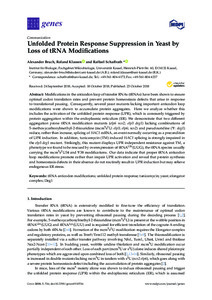Aufsatz

Unfolded Protein Response Suppression in Yeast by Loss of tRNA Modifications
Abstract
Modifications in the anticodon loop of transfer RNAs (tRNAs) have been shown to ensure optimal codon translation rates and prevent protein homeostasis defects that arise in response to translational pausing. Consequently, several yeast mutants lacking important anticodon loop modifications were shown to accumulate protein aggregates. Here we analyze whether this includes the activation of the unfolded protein response (UPR), which is commonly triggered by protein aggregation within the endoplasmic reticulum (ER). We demonstrate that two different aggregation prone tRNA modification mutants (elp6 ncs2; elp3 deg1) lacking combinations of 5-methoxycarbonylmethyl-2-thiouridine (mcm^5s^2U: elp3; elp6; ncs2) and pseudouridine (Ψ: deg1) reduce, rather than increase, splicing of HAC1 mRNA, an event normally occurring as a precondition of UPR induction. In addition, tunicamycin (TM) induced HAC1 splicing is strongly impaired in the elp3 deg1 mutant. Strikingly, this mutant displays UPR independent resistance against TM, a phenotype we found to be rescued by overexpression of tRNA^Gln(UUG), the tRNA species usually carrying the mcm^5s^2U34 and Ψ38 modifications. Our data indicate that proper tRNA anticodon loop modifications promote rather than impair UPR activation and reveal that protein synthesis and homeostasis defects in their absence do not routinely result in UPR induction but may relieve endogenous ER stress.
Citation
In: Genes 2018 / 9 (2018-10-23) , S. 516 ; EISSN: 2073-4425Sponsorship
Gefördert durch den Publikationsfonds der Universität KasselCitation
@article{doi:10.17170/kobra-20190130129,
author={Bruch, Alexander and Klassen, Roland and Schaffrath, Raffael},
title={Unfolded Protein Response Suppression in Yeast by Loss of tRNA Modifications},
journal={Genes},
year={2018}
}
0500 Oax 0501 Text $btxt$2rdacontent 0502 Computermedien $bc$2rdacarrier 1100 2018$n2018 1500 1/eng 2050 ##0##http://hdl.handle.net/123456789/11051 3000 Bruch, Alexander 3010 Klassen, Roland 3010 Schaffrath, Raffael 4000 Unfolded Protein Response Suppression in Yeast by Loss of tRNA Modifications / Bruch, Alexander 4030 4060 Online-Ressource 4085 ##0##=u http://nbn-resolving.de/http://hdl.handle.net/123456789/11051=x R 4204 \$dAufsatz 4170 7136 ##0##http://hdl.handle.net/123456789/11051
<resource xsi:schemaLocation="http://datacite.org/schema/kernel-2.2 http://schema.datacite.org/meta/kernel-2.2/metadata.xsd"> 2019-01-31T10:46:13Z 2019-01-31T10:46:13Z 2018-10-23 doi:10.17170/kobra-20190130129 http://hdl.handle.net/123456789/11051 Gefördert durch den Publikationsfonds der Universität Kassel eng Urheberrechtlich geschützt https://rightsstatements.org/page/InC/1.0/ tRNA anticodon modifications unfolded protein response tunicamycin yeast elongator complex Deg1 570 Unfolded Protein Response Suppression in Yeast by Loss of tRNA Modifications Aufsatz Modifications in the anticodon loop of transfer RNAs (tRNAs) have been shown to ensure optimal codon translation rates and prevent protein homeostasis defects that arise in response to translational pausing. Consequently, several yeast mutants lacking important anticodon loop modifications were shown to accumulate protein aggregates. Here we analyze whether this includes the activation of the unfolded protein response (UPR), which is commonly triggered by protein aggregation within the endoplasmic reticulum (ER). We demonstrate that two different aggregation prone tRNA modification mutants (elp6 ncs2; elp3 deg1) lacking combinations of 5-methoxycarbonylmethyl-2-thiouridine (mcm^5s^2U: elp3; elp6; ncs2) and pseudouridine (Ψ: deg1) reduce, rather than increase, splicing of HAC1 mRNA, an event normally occurring as a precondition of UPR induction. In addition, tunicamycin (TM) induced HAC1 splicing is strongly impaired in the elp3 deg1 mutant. Strikingly, this mutant displays UPR independent resistance against TM, a phenotype we found to be rescued by overexpression of tRNA^Gln(UUG), the tRNA species usually carrying the mcm^5s^2U34 and Ψ38 modifications. Our data indicate that proper tRNA anticodon loop modifications promote rather than impair UPR activation and reveal that protein synthesis and homeostasis defects in their absence do not routinely result in UPR induction but may relieve endogenous ER stress. open access Bruch, Alexander Klassen, Roland Schaffrath, Raffael doi:10.3390/genes9110516 publishedVersion EISSN: 2073-4425 9 Genes 516 2018 </resource>
The following license files are associated with this item:
Urheberrechtlich geschützt

